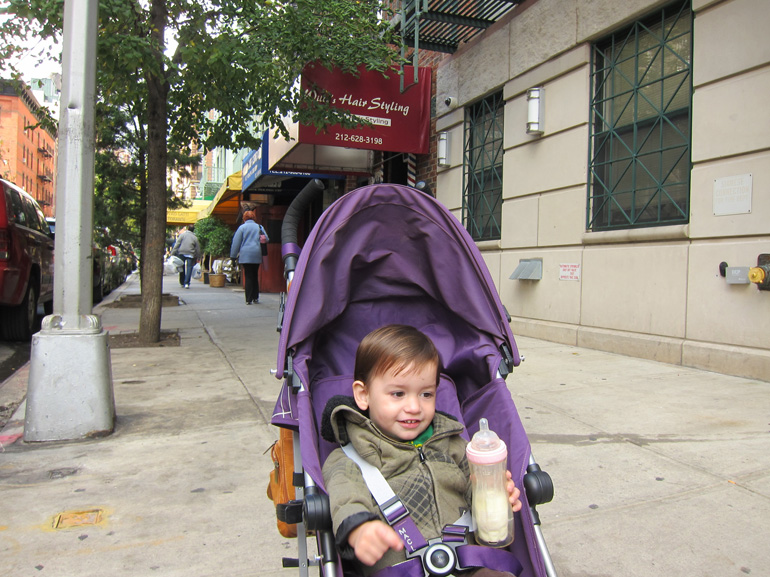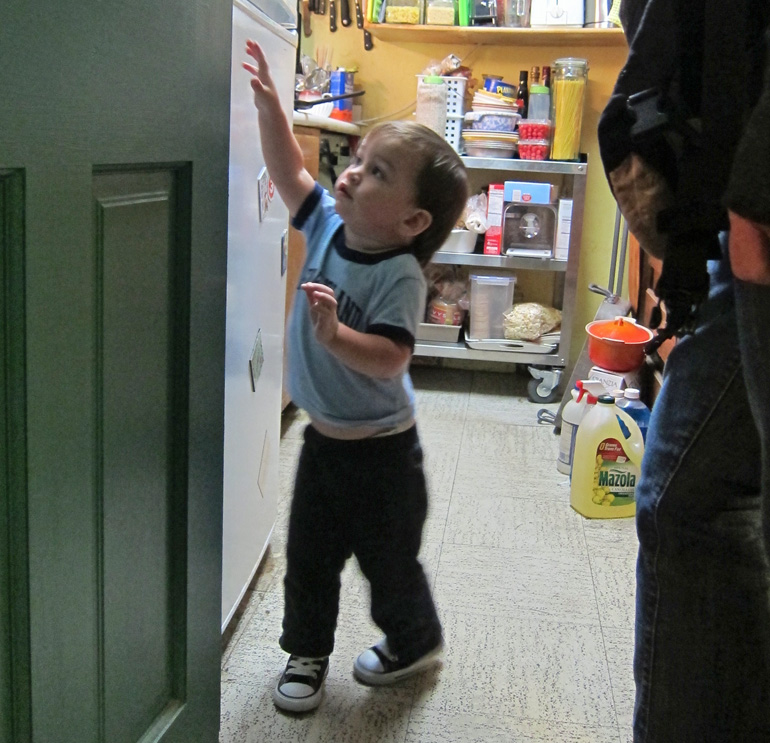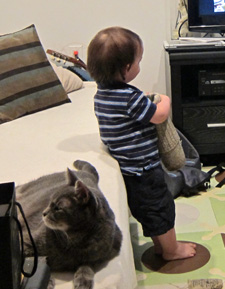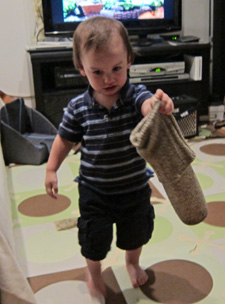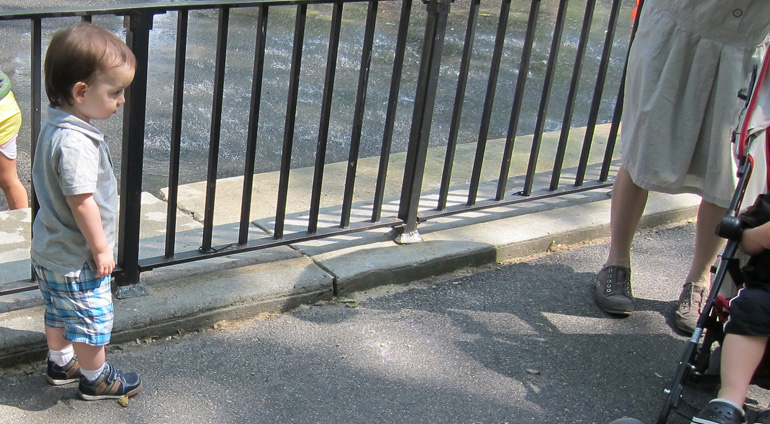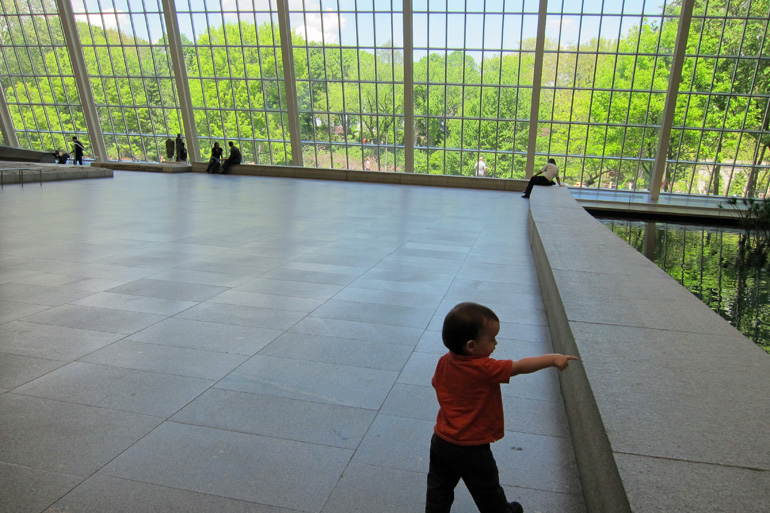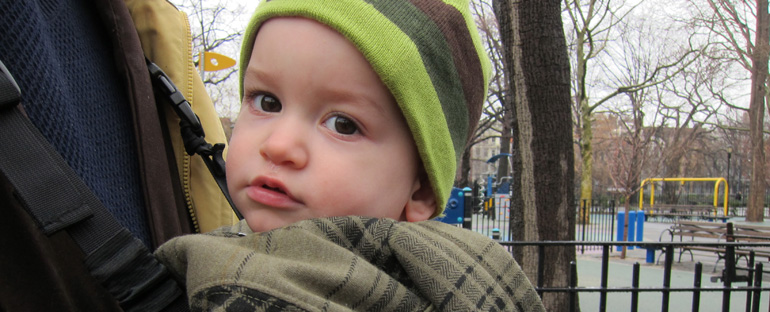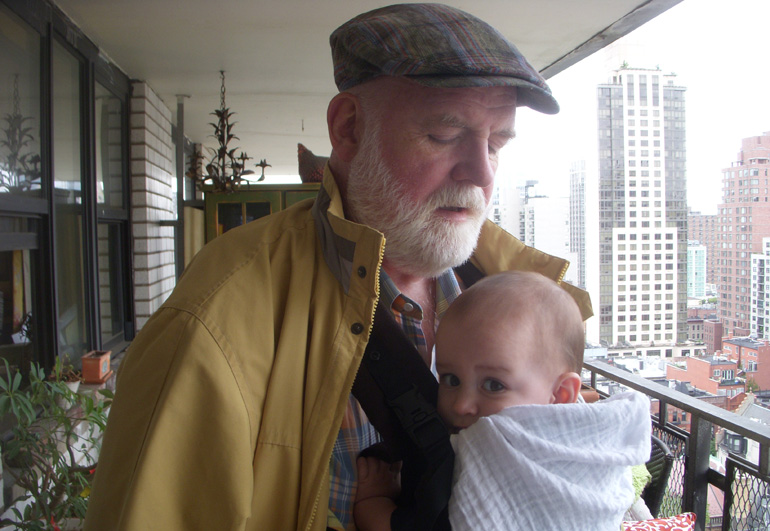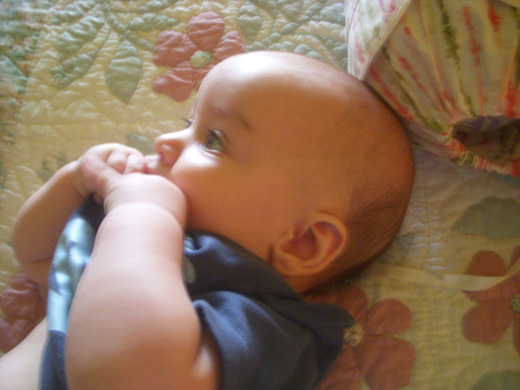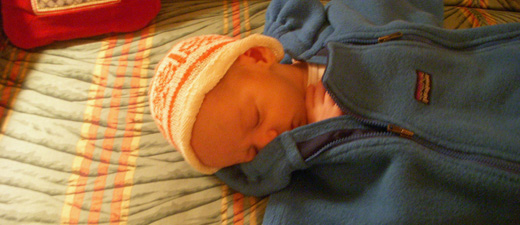
At about four o’clock yesterday afternoon — evening, really; it gets dark so early these days — Will was in his stroller and I was about to push him across Avenue C. Kathleen and I were taking him to Tompkins Square Park to play for an hour. On the opposite corner, outside the beer garden, a fair-complexioned woman in her fifties was smiling at me. She had the open, un-made-up face of a former nun, with slightly flyaway hair. She was walking with a cane that she did not seem particularly to need. I could tell this because she did not wait for the traffic light to change in favor of our crossing Avenue C. She was already across the street by the time the light changed. She had beamed at me — well, beaming is perhaps a bit intense — the whole way, and I had smiled back, something I’d never have done if I’d been alone. Will has made a proudly gregarious grandpapa out of me, and I am not shy about acknowledging the appreciation of strangers. But the woman was smiling at me, and I probably oughtn’t to have been so surprised when she said, as she passed us, “You have a beautiful beard.” Emphasis supplied.
***
On Friday morning, I went to see Hugo. I encourage everyone who likes going to the movies to see it, because, as a beautiful tribute to the inventiveness of Georges Méliès, it honors the roots from which the “filmed entertainment” of today has grown. It’s a reminder that movies can be as great as they are hokey.
Hugo is based on a Young Adult novel by Brian Selznik, The Invention of Hugo Cabret. I’m finding that there are two kinds of Young Adult fiction. Someday This Pain Will Be Useful to You, by Peter Cameron, is the best book that I can think of that really deserves the classification, but Jane Eyre is probably the most famous. The other type of Young Adult fiction ought better to be described as Ageing Child. Unlike true Young Adult novels, books for Ageing Children — and Hugo Cabret would seem to be one; David Mitchell’s last novel, The Thousand Autumns of Jacob de Zoet turned out to be another, even though it was ostensibly aimed at Adult Adults — are closed off from complexity. Complications abound, but they’re all sorted out in the end, and often long before. There’s nothing wrong with that, really, but it can be heavy when it isn’t amusing. And Hugo’s tale is not very amusing.There is not a lot of fun in the story of Hugo, an orphan who winds all the clocks at the Gare du Nord in the middle of the 1920s. Fun for us, I mean; Hugo’s story is implausible where it ought to be interesting. But I’ll be making it sound like Dickens if I keep this up.
The joy of Hugo is that Martin Scorsese has embedded the boy’s own story in a Wunderkammer of cinematic treats. Who’s that man in round-lensed spectacles whom Hugo nearly knocks over as he flees the monomaniac station inspector, who loves nothing so much as sending urchins off to the orphanage? Why, it’s James Joyce! Why are those immense statues in the cemetery so familiar? Because they’re blown-up versions of the mourners from the tomb of Jean sans Peur in Dijon — they were exhibited here, at the Museum, last year. Most of all, stealing the show as it nears the finale, is the story of Méliès, and the recreation, in 3D, of famous bits and pieces from his vast output. As an homage to the movies, it outclasses anything every produced for the Academy Awards. The story of Hugo aside, Hugo tremendously moving without being disagreeably sentimental.
 Two things keep Hugo from being truly magical, at least for this grown-up. First, the cast. The cast is superb (insert formulaic encomia here), but its members are British, or at any rate not French. This bit of catering to American provinciality, exploiting English accents to signify “abroad,” is nothing less than embarrassing, and embarrassing more or less every time an actor opens his mouth. The other thing is the movie’s indulgence of a perverse desire to look down on the Eiffel Tower from a great height. You can look down on the Eiffel Tower from a great height if you are in some kind of airplane, or dirigible, or other flying contraption. You cannot look down upon it from nearby mountaintops, because there aren’t any in Paris, and you most certainly cannot look down on the Eiffel Tower from the campanile at the Gare du Nord, because there isn’t one of those, either, and even if there were it would only be tall enough to look up. There’s a perfectly dreadful moment when the little girl in the story asks Hugo where he lives. They’re strolling along the Seine, near Notre Dame, at this point, but that doesn’t stop Hugo from pointing, “Over there,” to a cgi shot in which the terminal is given a more convenient, riverside location. Hollywood.
***
On Saturday night, we went to a birthday party. We thought that we were going to an Orpheus concert at Carnegie Hall, but life is not simple. The concert turned out to be a tie-in, broadcast live, with the 75th anniversary of the founding of WQXR, the radio station that was owned by the New York Times for decades and that now forms a part of New York Public Radio. Seventy-five years! When I say that that doesn’t seem a very long time, what I mean is that this portal to classical music that I discovered on my own when I was nine or ten and passing the time on a sick day, is only twelve years older than I am. Which isn’t old at all, right?
What with announcements from various representatives of the organizations involved, the music didn’t begin until 7:25. The evening’s soloist, oboist Albrecht Mayer, tacked two encores onto his performance. These were followed by the world’s longest interval. You could have enjoyed a turkey dinner during the intermission, and perhaps taken in a night-club act as well. Kathleen was in agony. A nerve in her shoulder got pinched somehow, and her left arm ached no matter how she positioned it. Ordinarily, I would have offered to take her home, but I really really wanted to hear Haydn’s Drum Roll Symphony, and Kathleen indulged me. She said that she’d feel better at dinner, after she took some Advil, which, in the event, she did. But before the Haydn we had a new composition by Andrew Norman, a young composer who now lives in Brooklyn. Even in her pain, Kathleen thought that it was interesting. But she had no taste for Haydn afterward. Abandoning herself to daydreams of walking on the beach (“It worked”), she got through the final half hour without giving the music a thought.
It was exactly the sort of performance that is the whole reason for going to Orpheus concerts. It made the familiar symphony entirely fresh, which is to say, I suppose, that it completely rewrote my impression of the work. I mean to use the idea of rewriting in its recent digital or cognitive sense. The rewriting didn’t involve very much that was absolutely new, but even as it clarified my response — I saw the first movement as a study in framing, and grasped (partly, no doubt, because Kathleen wasn’t feeling well) that, aside from the minuet, its movements are reluctant to conclude. In the minuet, at about Bar 19, there’s an orchestral thickening that brings Schubert’s arduous workouts to mind, and that quite shatters any notion of a courtly dance. My overall feeling about the symphony — that it ought to go by the nickname “Creation,” not “Drum Roll” — was reinforced at almost every moment of the performance. Never more so than in the finale, however: this movement more and more strikes me as a fraternal twin of the “Hallelujah” chorus that ends Part II of Das Schöpfung, “Vollendet ist das große Werk.” Like the oratorio, the symphony is as grand as it is possible to be without an iota of pomposity.
The concert began — when it began — with Hindemith’s Kammermusik Nº 1, written in 1922 for the Donaueschingen Festival. I am not crazy about Hindemith, and I thought that I was being funny when I told Kathleen that, although the program allotted sixteen minutes to the work’s performance, its duration was actually eternal. This turned out to be fatuous. After a rambunctious but very brief overture and an agreeable opening movement, there’s an enchanting quartet for winds and percussion that sets the mood of classic Chinese landscapes, hushed, delicate, and sweetly forlorn. As for the finale, with its ostinato growls it might well be thought of as Le Sacre de Weimar. It’s otiose to ask if Hindemith had Stravinsky in mind (of course he did!), but the surprise is the completeness with which Hindemith makes his borrowings all his own. It goes without saying that a German response to Stravinsky’s mad ecstasy would, after the Great War, take the form of chamber music.
***
On the front page of today’s Times, there’s a story about the soon-to-be-discontinued visits that the submersible vessel Mir has been paying to the wreck of the Titanic. Further proof that the centenary of the world’s most famous shipwreck is upon us came to me during the coming attractions trailers that preceded Hugo on Friday. Among the many marvels that I have lived to see is the ability to refit an old movie in 3D, and Titanic, one of the worst movies ever made, is getting the treatment, for release next year. I mention this only because the trailer afforded a glimpse of Bernard Hill, as Captain Edward James Smith. It was the first glimpse that I’d had, since Willy, the barber who keeps my beard looking beautiful, took to calling me Capitán because I remind him of Captain Smith. It’s not a comparison that, given the outcome, I’m particularly keen about, but it’s certainly more dignified than Santa Claus, so I go with it. On balance, I think that I have a much more beautiful beard — er, well-shaped — than the the one with which Bernard Hill was supplied.
Not my beautiful grandson. (And he is beautiful.) My beautiful beard. But what was I thinking? I was in the East Village!







